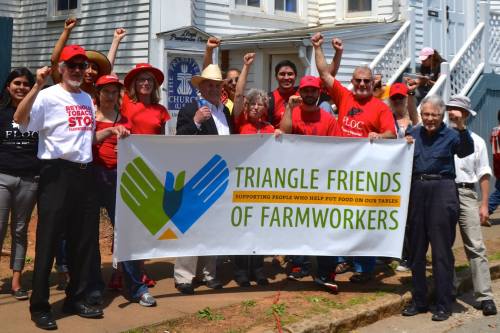Imagine that Farmworkers Were Not Afraid of Losing Their Jobs
 Tuesday, May 12, 2015 at 9:49AM by
Tuesday, May 12, 2015 at 9:49AM by  Jennie Belle
Jennie Belle
By: Dave Austin, FLOC Organizer

At the 4/16/15 Farmworker Institute I again had the pleasure of talking with farmworker support organization staff from around the state about their important work. The organizations ranged from farmworker health services to legal aid services to housing rehab services to faith-based institutions providing material and spiritual aid to farmworkers. These dedicated folks are uniformly devoted to their work, and to farmworkers. But I couldn’t help hearing some frustration and resignation in their voices when I asked about the impacts they feel they are making. For example, staff of an organization that provides health services for migrant farmworkers talked to me about barriers they face. Certainly farmworkers face living and working condition hazards that result in poor health. But beyond that truism, I heard these service providers saying things like:
- Identifying health risks/hazards for farmworkers through health education and training has little impact, because farmworkers are powerless to insist on changes – especially if those changes would cost the grower.
- Workers are extremely reluctant to ask for time off for illness, or to see a health care provider about symptoms. They fear losing wages, and also retaliation. They fear for their jobs.
- The opportunity to enact more effective health & safety regulations and laws is severely limited because the current political climate tends in the opposite direction and/or there is no worker constituency that can argue on its own behalf, and behind which supporters could rally. And even if a new regulation was passed, it’s doubtful there would be meaningful enforcement on the ground.
The responses from staff in other farmworker service sectors (e.g. legal support of worker rights; housing) were pretty similar. A summarizing conclusion might be: no matter how good our outreach; no matter how well and conveniently we provide services; no matter how strategically we plan policy change campaigns, farmworkers’ fear of losing their jobs, or discrimination on the job, stalls their participation. And that participation is absolutely essential to meaningful accomplishment for our organizations/agencies. Farmworkers’ fear undercuts the impacts we might have.
My own conclusion is that, over the years, there are more and more farmworker support organizations/agencies, working harder and harder, but – as illustrated in SAF’s film Harvest of Dignity – having only limited significant impact on farmworkers’ lives across the state. As a volunteer with the Farmworker Labor Organizing Committee (FLOC), I believe that only membership in a union can afford a farmworker the job protection that will allow him/her to collaborate with, to facilitate, and to benefit from, the services that farmworker support organizations provide.
While many people know little about FLOC or how a union operates, with each successful grievance resolution more FLOC members understand how the union works. Building the union is painstaking work. And the work is not just in the fields and labor camps. To build farmworker organizations, there must be “freedom of association” for farmworkers – that is, farmworkers must have the legally protected right to join together in whatever kind of association they decide they need. To achieve that right, FLOC is coordinating a “corporate campaign” that is pressuring RJ Reynolds and the other international tobacco companies to affirm this right, and its guaranteed implementation “on the ground” -- because only large corporate commodity processors like RJR have the power and resources to insure this systemic change of a major guarantee of human rights for farmworkers in the commodity chain.
This corporate campaign requires engaging diverse allies, from national faith based organizations to the international allies, like progressive members of the British Parliament, and labor allies in Europe. It is also a massive job. Farmworker unions, like Cesar Chavez’ United Farm Workers, have succeeded only when there was consistent, strong public support. That help is often just showing up – at a rally, at a corporate shareholders meeting, or wherever, because public support is what ultimately wins corporate campaigns – when large corporations finally see what the advocates see – that creating a system that recognizes worker human rights is, ultimately, a win-win for corporate processors, for growers, and for workers.
There would seem to be no more natural allies for farmworker union organizing than staff/volunteers/friends of farmworker support organizations -- because you already know about the conditions farmworkers face, including their fear of losing their jobs. I hope you will hear this plea to lend support – either organizationally, or personally, or both, to the farmworker union organizing effort.










Reader Comments